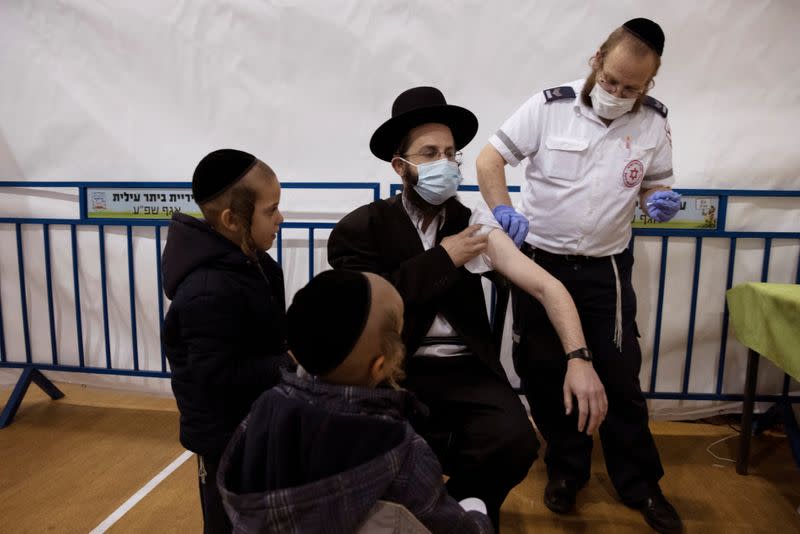By Maayan Lubell
JERUSALEM (Reuters) – Outside the synagogue in the ultra-Orthodox neighborhood of Jerusalem, Har Nof, a poster bears the name of Osnat Ben Sheetrit, a pregnant mother of four who died of COVID-19, and the words: “For the ascension of your soul, be vaccinated. “
The harsh message is part of a health ministry campaign targeting Israel’s 1.2 million ultra-Orthodox Jews, the community hardest hit by the coronavirus, but also blamed by many secular Israelis for prolonging the pandemic, ignoring the blocking rules.
Now, the rate of infections among haredim, as they are known in Israel, has dropped dramatically, falling below the national average for the first time since the pandemic began. Serious illness cases have also declined, and vaccine acceptance is 72%, a comparatively high rate worldwide, although still below the national rate of 86% in Israel.
The change comes behind a decree by the main rabbis of the Haredim, who for some hold far more authority in their communities than the state, to endorse the vaccine when Israel began its national launch in late December.
“I personally went to rabbi classes and sat down with the rabbis and the public,” said Ran Balicer of Clalit, Israel’s largest health provider.
“The end result was that the rabbis declared the rabbinic verdict that the vaccine is safe and effective and must be taken.”
The decision was a turning point for the virus-ravaged community, where in February, one in 100 Israeli ultra-Orthodox Jews over the age of 60 had died of COVID-19 – almost six times more than among their traditional peers.
The Haredim, who make up about 12% of Israel’s 9.3 million population, represent 28% of the total registered 800,000 cases of coronavirus, according to Eran Segal, data scientist at Israel’s Weizmann Institute of Science.
However, things are looking up. According to the ministry of health, they now represent almost the same share of new cases as their relative share of the population, even slightly less, and have also seen the biggest drop in serious illnesses than any other sector since a third wave hit. the peak in mid-January.
RESENTMENT
However, even with the implementation of the world’s leading vaccination in Israel, starting to pull the country out of the depths of the pandemic, there will be no quick end to the social and political tribute of the ultra-Orthodox.
“When a haredi man gets on the bus, everyone looks at him as if he were a leper, so the haredim feel persecuted, they lack empathy with them,” said Roni Numa, who heads the ultra-orthodox ministry of health task force.
A protracted electoral standoff shows Prime Minister Benjamin Netanyahu entering his fourth election in two years on March 23, with ultra-Orthodox parties being the mainstay of his right-wing coalition.
And while Netanyahu received applause at home and abroad for launching the vaccine, prolonged blockages were hurting the economy.
Many blamed the haredim, some of whose rabbis instructed followers to defy the law and send students to classes, angering traditional Israelis, whose schools remained closed.
“You could see (blockade) violations in all Israeli sectors … but what happened in the Haredi community … is that the violations came from the leadership,” said Yair Ettinger, religious affairs analyst at Israel Kan’s public broadcaster. .
In addition, Netanyahu was seen as ignoring blatant blockade violations among the ultra-Orthodox for what critics say are political reasons.
Anger rose when the evening news showed photos of mass funerals with thousands of Haredim huddled in the street, and social networks filled with videos of major weddings and holiday celebrations.
Numa said that, on the ground, the overwhelming majority of Haredim maintained the blockade. Ultra-Orthodox leaders said their community was being unfairly examined.
Compliance, or lack thereof, was not the only factor in how the Haredim fared during the pandemic – it spread quickly within the united community, whose large families live in densely populated neighborhoods and cities.
Avoiding secular culture, many ultra-Orthodox were slow to obtain information about the pandemic that other Israelis achieved through television, newspapers and the internet.
In addition, with seven children per average ultra-Orthodox family, most often living in a small house, the blockade was a struggle for many of the Haredim who followed him.
“We don’t have Zoom, everything was done over the phone, all families had to get hold of the phones and each child had to find a quiet space at home,” said Chadad.
While most Israeli children continued to learn remotely in virtual classes, the Haredim remained isolated.
But Chadad said the worst was now behind Israel’s Haredim. “We are beating the coronavirus. With God’s help, we will be a light to the nations and return to normal life quickly.”
(Additional reporting by Dedi Hayun and Ronen Zvulun; Writing by Maayan Lubell; Editing by Raissa Kasolowsky)
